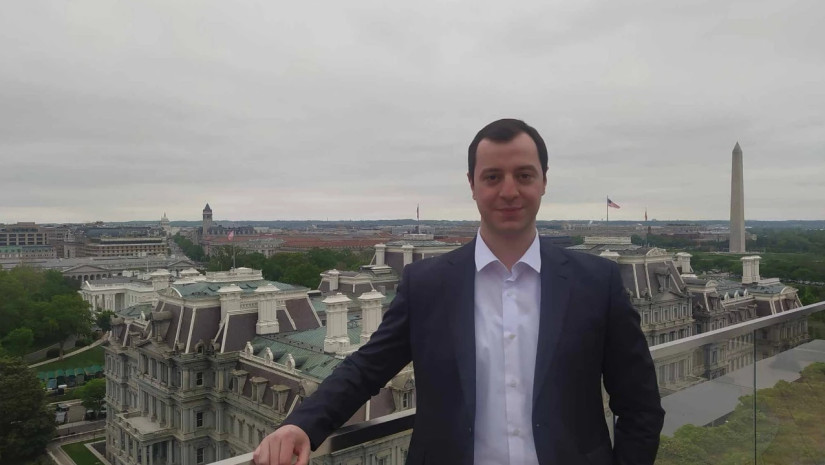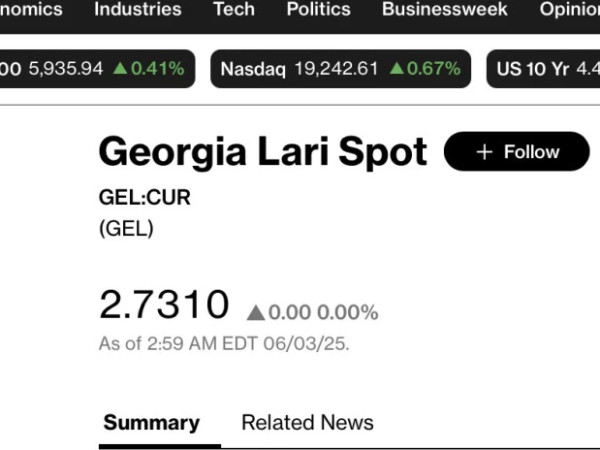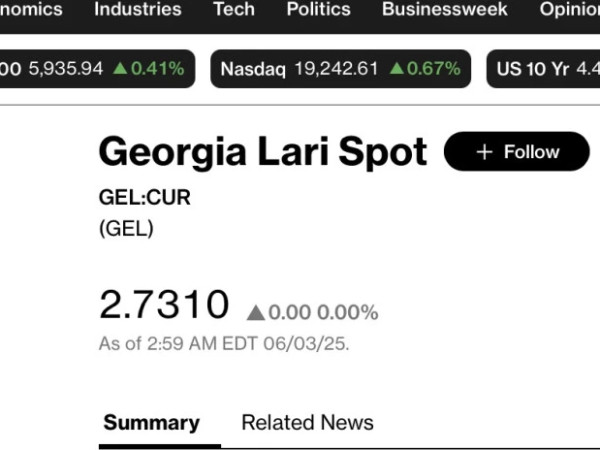Donald Trump is transitioning from a trade war to a legal battle. The U.S. President does not share the position of the United States Court of International Trade, which ruled that he exceeded his authority by imposing tariffs. The decision of the U.S. Court of International Trade hinders Trump, implying that some of the tariffs he imposed may be repealed. To defend his position and bring the decision to impose tariffs into effect, the head of the White House has appealed to the Federal Appellate Court. The latter has temporarily suspended the lower court’s decision and reinstated the tariffs imposed by the Trump administration.
The Court of International Trade determined that the President exceeded his authority, and the imposition of tariffs for the reasons he cited was unconstitutional. What does the court’s decision entail? On this issue, ,,Commersant'' spoke with international trade law expert Buba Bagdavadze. According to his explanation, the court judgment is not final, and the legal dispute on tariffs continues. The expert clarifies that even if the highest judicial body declares the decision to impose tariffs unconstitutional, it does not mean that the tariffs will ultimately not take effect. The reason for this lies in other legal mechanisms currently in operation in the U.S. The most important aspect of the adopted decision is that trade relations conducted by the U.S. must be subject to a legal framework.
“The institution that issued the judgment is the United States Court of International Trade. It operates at the federal level, specializes in trade-related issues, and its judgment is mandatory for execution. The decision has a significant impact. At this stage, we are talking about the repeal of the 10% universal tariffs. The judgment is not final. It was immediately met with a response from the President’s administration, and was appealed to the U.S. Court of Appeals for the Federal Circuit. Thus, we do not have a final result regarding the tariffs at this stage, but the existing precedent already provides us with the following: it is a good example that, in the U.S., trade policy, regardless of the political justification accompanying it, must be subject to a legal framework. The decision directly indicates the limits of the President’s authority and notes that the International Emergency Economic Powers Act of 1977 assigns the imposition of such tariff regimes directly to the competence of Congress, not the President’s authority. The President’s administration clearly states that, apart from the 1977 Act, there are other legal mechanisms that are currently in effect and provide a basis for the use of tariffs. For example, Section 232 of the Trade Expansion Act, on the basis of which tariff regimes have been introduced for steel, aluminum, and automobiles. Similar mechanisms may also be applied as an exception instead of the 1977 Act,” explains Buba Bagdavadze.
We asked the international trade law expert whether the court’s judgment would affect the stability of trade relations. Buba Bagdavadze believes that this issue is directly related to the effectiveness of the combination of legal mechanisms. According to his explanation, the President has other grounds for enacting tariffs.
“Given that this measure is tied to internal state mechanisms, its effectiveness is directly related to the extent to which it can cause certain types of changes, including in trade policy. This precedent, even if supported by the Supreme Court, does not have such an impact that it leaves the President’s institution with only one course of action. Such events are not the first for the U.S. During Nixon’s time, the courts also actively considered the use of economic measures during emergencies. Subsequently, judicial practice has supported narrowly defining the President’s authority in unilaterally imposing tariff measures, which already creates certain prospects that such mechanisms may be softened or prolonged in the process of their introduction by the U.S. It is difficult for me to say to what extent this ensures stability or how predictable the environment will be, but the court can have a certain impact. If we measure it qualitatively, the impact may not be colossal, but in the short term, we have already seen effects on currency and stock exchanges. This is an indicator that the court’s decision can at least slightly alter the existing situation,” states Buba Bagdavadze.
We asked the international trade law expert what impact the court’s decision, if it remains unchanged, would have on Georgian businessmen exporting products to the U.S. Buba Bagdavadze explains that if the decision is finally approved, the 10% tariffs will no longer apply to Georgian exporters. Buba Bagdavadze clarifies that the U.S. tariff regime will influence the tariff regimes of countries that had introduced so-called reciprocal tariffs. Behind the term “reciprocal tariffs,” the American ruling elite envisions a mechanism to address negative trade balances, through which they aim to change what they perceive as unfair treatment toward the U.S. Trump believes that the current international trade order is unfair to the U.S.
“In the event of the repeal of the discussed tariff regime, the 10% tariff will no longer apply to Georgian exporters. Additionally, I want to explain the general context to understand what process we are dealing with now. This type of judgment will have a significant effect in terms of its impact on other markets. The U.S. tariff regime will also influence the tariff regimes of countries that had introduced so-called reciprocal tariffs. What is happening now, even in the context of a legal dispute, is a substantive continuation of the modern international trade process. During the dispute, in the context of the President’s authority, the government’s argumentation was that such a decision by the President was based on a policy to influence certain types of direct tariffs or other trade barriers imposed on the U.S. in the process of diplomatic negotiations with other countries. The court’s response was that, regardless of the diplomatic method used in international trade relations, it must remain within legal boundaries. It was also clarified that the President’s decision must align with the International Emergency Economic Powers Act. Therefore, a thorough understanding of such precedents is important for correctly determining economic expectations. Moreover, it may have a direct impact, as our country exports goods to the U.S., such as alcoholic beverages and black metal pipes, and the companies that challenged the universal tariff measures were precisely importers of such products in the U.S. Such processes will have a certain effect on the trade activities of Georgian companies and market diversification,” declares Buba Bagdavadze.
Past tariff wars between countries laid the foundation for creating an international trade regime. “Where high tariffs ultimately led to a process where, sometimes as a result of negotiations, tariffs were entirely repealed, and a free trade space was created between countries. To protect this status quo, today’s international trade regime reveals certain weaknesses, but the process follows previously existing trends,” states our respondent. Buba Bagdavadze says that the decision of the United States Court of International Trade has already produced a certain effect, reflected in stock exchanges and currency. According to him, the court’s decision creates new expectations for producers, which, in turn, affects prices and market diversification.
“Within the U.S., adherence to the principles of a legal state has such a direct impact that it is possible to tangibly represent certain tariff changes through the courts. This, among other things, creates certain economic expectations and has an impact on currency or stock exchange data. Based on this decision, we have already seen a certain type of direct effect. There have been clear changes in the context of stock exchanges and the strengthening of the dollar. Economic expectations arise among producers, the process affects production initiatives as well as investments. It also impacts trade prices and market diversification. Tariff regimes practically affect people’s living standards and interstate relations, and therefore, the role of courts in all this is very significant. Accordingly, in the U.S., along with all other legal mechanisms, the principle of separation of powers and the principle of a legal state gain particular importance,” declares Buba Bagdavadze.
In the appellate court, the parties requesting the repeal of the tariffs must present their position by June 5. The U.S. government has until June 9 to respond.


















